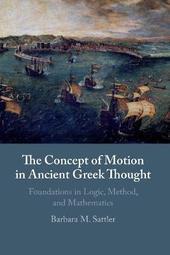
|
The Concept of Motion in Ancient Greek Thought: Foundations in Logic, Method, and Mathematics
Paperback / softback
Main Details
| Title |
The Concept of Motion in Ancient Greek Thought: Foundations in Logic, Method, and Mathematics
|
| Authors and Contributors |
By (author) Barbara M. Sattler
|
| Physical Properties |
| Format:Paperback / softback | | Pages:437 | | Dimensions(mm): Height 228,Width 152 |
|
| Category/Genre | Western philosophy - Ancient to c 500
Philosophy - logic
Philosophy of science
History of science |
|---|
| ISBN/Barcode |
9781108745215
|
| Classifications | Dewey:116 |
|---|
| Audience | | Professional & Vocational | |
|---|
| Illustrations |
Worked examples or Exercises
|
|
Publishing Details |
| Publisher |
Cambridge University Press
|
| Imprint |
Cambridge University Press
|
| Publication Date |
4 November 2021 |
| Publication Country |
United Kingdom
|
Description
This book examines the birth of the scientific understanding of motion. It investigates which logical tools and methodological principles had to be in place to give a consistent account of motion, and which mathematical notions were introduced to gain control over conceptual problems of motion. It shows how the idea of motion raised two fundamental problems in the 5th and 4th century BCE: bringing together being and non-being, and bringing together time and space. The first problem leads to the exclusion of motion from the realm of rational investigation in Parmenides, the second to Zeno's paradoxes of motion. Methodological and logical developments reacting to these puzzles are shown to be present implicitly in the atomists, and explicitly in Plato who also employs mathematical structures to make motion intelligible. With Aristotle we finally see the first outline of the fundamental framework with which we conceptualise motion today.
Author Biography
Barbara Sattler is Senior Lecturer in Philosophy at the University of St Andrews. She works mainly on metaphysics and natural philosophy in the ancient Greek world, with a particular focus on the Presocratics, Plato and Aristotle.
Reviews"Barbara Sattler's book is engaging, sophisticated and full of stimulating ideas. It traces the development of crucial presuppositions of natural science from their earliest roots in Parmenides to their fruition in Aristotle. The perspective and expertise which Sattler brings to these issues will be of great interest and value to those working in ancient philosophy or in the history of science." Stephen Makin, University of Sheffield
|